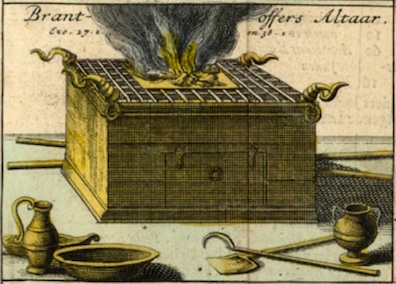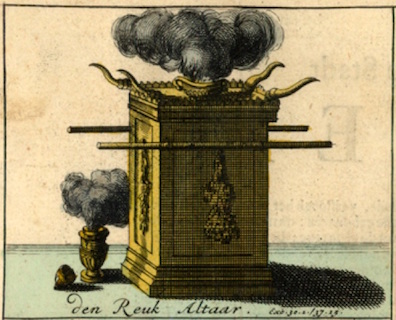Stephen's somber fantasy, in Proteus, of priests
celebrating the Mass includes many odd details: Joachim as a celebrant, a choir
answering his "basiliskeyed"
stare with "menace and echo," and "jackpriests" (suggesting,
Gifford notes, "priests in name only") who are "oiled and
gelded." Perhaps the strangest is the image of servers "assisting about the
altar's horns." Catholic altars do not have horns, but ancient
Hebrew altars did. They seem to have been associated with the
sacrifice of bulls and other animals, and Stephen seems to
associate them with "the snorted Latin" of the priests. Later
in the novel, Bloom thinks of the offerings burned on such
altars.
Altars are mentioned throughout the Old Testament. The Hebrew
word, mizbe'ah or mizbach, means a place
of slaughter or sacrifice. Exodus describes altars of burnt
offerings, specifying that "thou shalt take of the blood of
the bullock, and put it upon the horns of the altar with thy
finger, and pour all the blood beside the bottom of the altar.
And thou shalt take all the fat that covereth the inwards, and
the caul that is above the liver, and the two kidneys, and the
fat that is upon them, and burn them upon the altar"
(29:12-13). Bloom's phrase in Lestrygonians, "kidney
burntoffering," indicates his awareness of this
tradition. In Calypso he has cut away some burned
flesh from his fried kidney and flung it as an offering to his
cat.
The horns, by all accounts, were on the four corners of the
altar. Exodus 27:2 says that they "shall be of the same"
shittim wood as the altar itself, and everything covered with
brass—suggesting that rather than attaching actual animal
horns to the altar, workmen carved wood in that shape. Some
passages (e.g., 1 Kings 1:50-53) indicate that fugitives could
seek asylum by clinging to these projections.
Stephen's meditations on the sacrifice of bulls, and on
priests snorting out the Latin of their rite, may bear some
connection to his own self-identification with oxen as "Bous Stephanoumenos,"
a wreathed sacrificial victim, and thus his status as the "bullockbefriending bard."
At the end of Scylla and Charybdis, he thinks again
of altars with burnt offerings: "Laud we the gods /
And let our crooked smokes climb to their nostrils /
From our bless'd altars."

